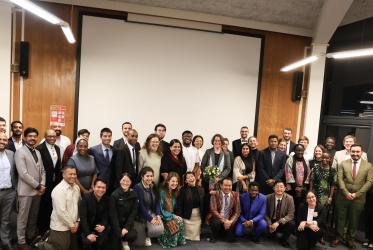Dr Julio de Santa Ana has had a decisive influence on shaping the ecumenical perception of the emerging development conflict as a challenge to the understanding of the Christian churches.
He was a Methodist lay theologian and sociologist from Uruguay.
Before becoming directly involved with the WCC he directed a Christian study centre on issues of church and society in Montevideo. The centre had a significant role in the formation of the Latin American Commission on Church and Society (ISAL) in 1962. As general secretary of ISAL, he participated in 1966 in the Geneva Conference on Church and Society which provided the intial impulse for the development debate in the ecumenical movement.
When after the Uppsala assembly the WCC Commission on the Churches Participation in Development (CCPD) was formed, Julio de Santa Ana, who had to leave his native country Uruguay for political reasons, was invited to join the staff of the commission as a study secretary.
At the WCC Nairobi assembly in 1975, he contributed decisively to refocussing the development discussion in the direction of the call for active solidarity and participation in the struggle of the poor and oppressed.
After the assembly, the CCPD decided to initiate a study process on "The Church and the Poor" which was directed by Julio de Santa Ana.
As author and editor he was responsible for the three significant publications arising from the study process. The insights gained were presented to the WCC central committee in 1980 with the document "Towards a church in solidarity with the poor". It raised fundamental ecclesiological und socio-ethical issues and stimulated intenisve and controversial discussion in the churches.
After having completed work on the study, Julio de Santa Ana followed C.I.Itty as director of the commission. Under his leadership, from 1979-1982, the Advisory Group on Ecomonic Matters (AGEM) began to to give shape to a new paradigm in political economy. This discussion was continued ten years later, prio to the WCC assembly at Canberra (1991), with reflections on "The political economy of the Holy Spirit" presented by Julio de Santa Ana.
Another controversial programme focussed on the economic role and political influence of Transnationl Corporations. After having presented the report on this study at the WCC central committee in 1982, Julio de Santa Ana left the staff of the WCC to return to Latin America and assume the position of executive secretary of the Ecumenical Center of Services for Evangelization and Popular Education, based in São Paulo, Brazil.
In his retirement he returned to Geneva and served as a part-time lecturer at the ecumenical institute Bossey.
With his combination of theological, philosophical and sociological erudition and competence Julio de Santa Ana was one of the leading ecumeical intellectuals in this past generation.
The World Council has received decisive impulses and challenges from him and will always honour his memory.
Rev. Dr Konrad Raiser
Former general secretary of the World Council of Churches




